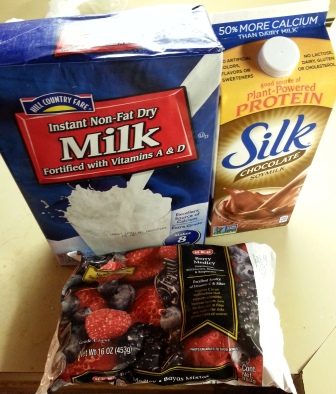Protein Blend as Good as Whey: Cheap Alternative Idea
A number of studies released in the past year1,2,3 have investigated the effects of various processed milk proteins such as casein and whey on muscle protein synthesis after resistance training.
One of these studies (1) found that a combination of the three proteins, whey, soy, and casein is just as effective as whey at increasing amino acid transporter expression, transport, and myofibrillar protein synthesis, due to the varying rate of digestion of the proteins and their release into the blood stream, affecting the availability of the amino acids (building blocks of protein).
This would make it seem that you don’t have to go buy whey or bust; instead, you could just go cheaper with protein blends in supplements. Not so fast. The researchers were able to control the leucine content of the beverage more than anyone trying to mix the stuff up himself or herself probably would.
Whey and soy are both high in leucine, with whey slightly higher. Whey is a more expensive ingredient though. Soy is not as expensive. Milk protein is udderly (ha) 20% whey and 80% casein naturally out of the cow udder. Whey is considered a fast digesting protein, soy is considered almost as fast (medium), and casein is considered a slower protein to digest.
Since dietary supplements are not regulated until after they reach the market, often when someone experiences an adverse effect, it is unlikely that the supplement manufacturer is also rigorously testing the leucine content unless it is third party certified by ConsumerLab or NSF. Knowing this, what can you do if you don’t want to go spend money on supplements that aren’t regulated?
Make your own next-best post-workout smoothie! Try some chocolate soymilk, nonfat dry milk (NFDM) aka powdered milk, and stir it up.

Probably cheaper than that supplement, too.
A 1-cup serving of chocolate soymilk has 17g sugar and 5g protein while 1 serving of NFDM has 12g sugar and 8g protein. Total, you get 13 grams of protein and 29g of sugar, which is roughly a 1:2.2 ratio of protein to carbohydrate. Make it a smoothie by adding a serving of frozen berries and you’ll be closer to the optimal 1:3 ratio of protein to carbohydrate that is recommended post-workout. Only 200-250 Calories, depending on whether you use berries. Double or halve it depending on your calorie needs.
Now you have a homemade smoothie consisting of a protein blend of soy, whey, and casein! Sounds too good to be true, huh? Of course, we’re not controlling the leucine content either, nor likely are the manufacturers of the supplements.
Why, then, are researchers allowed to create such artificial situations that aren’t able to be transferred into practice? It may have something to do with the fact that supplement manufacturers want to make money by processing simple, cheaper ingredients into something that may be demonstrated to be marginally better in an artificial, unrealistic, quixotic lab test than the original foods for the largest profit margin. Or, just for the sake of SCIENCE!


